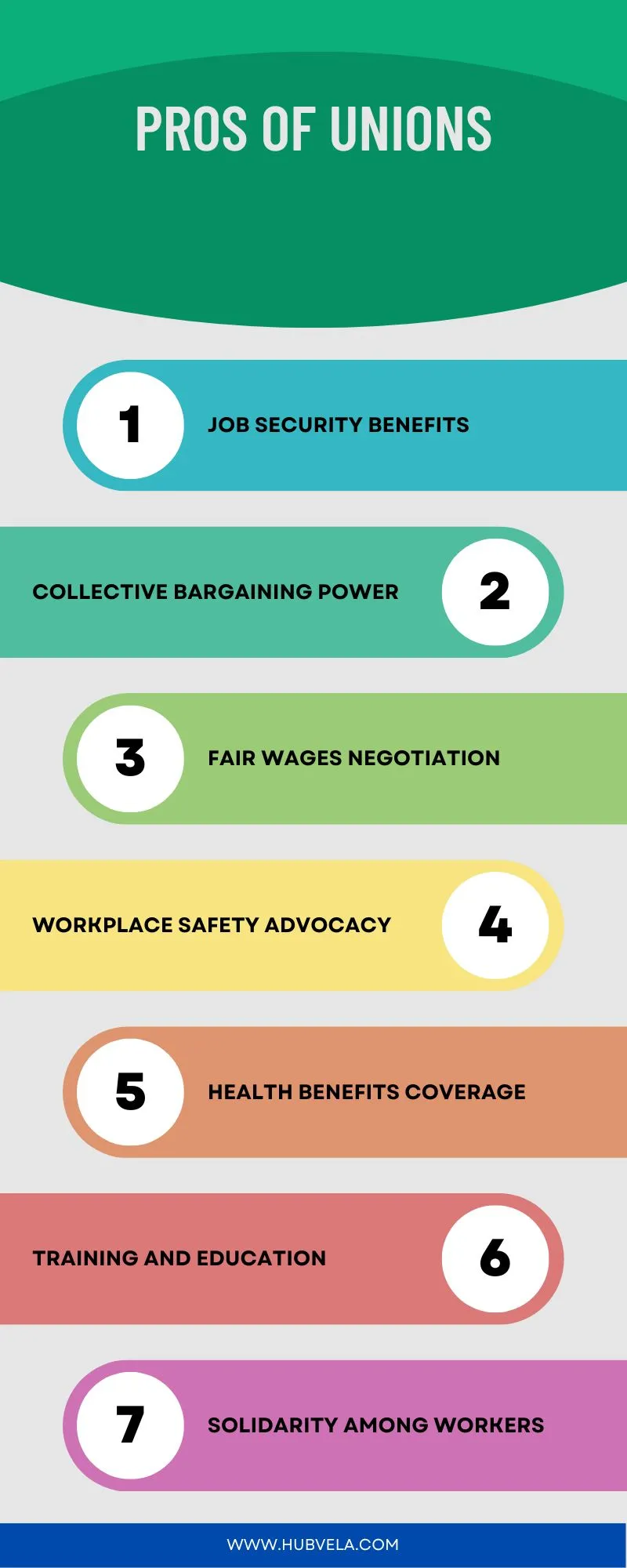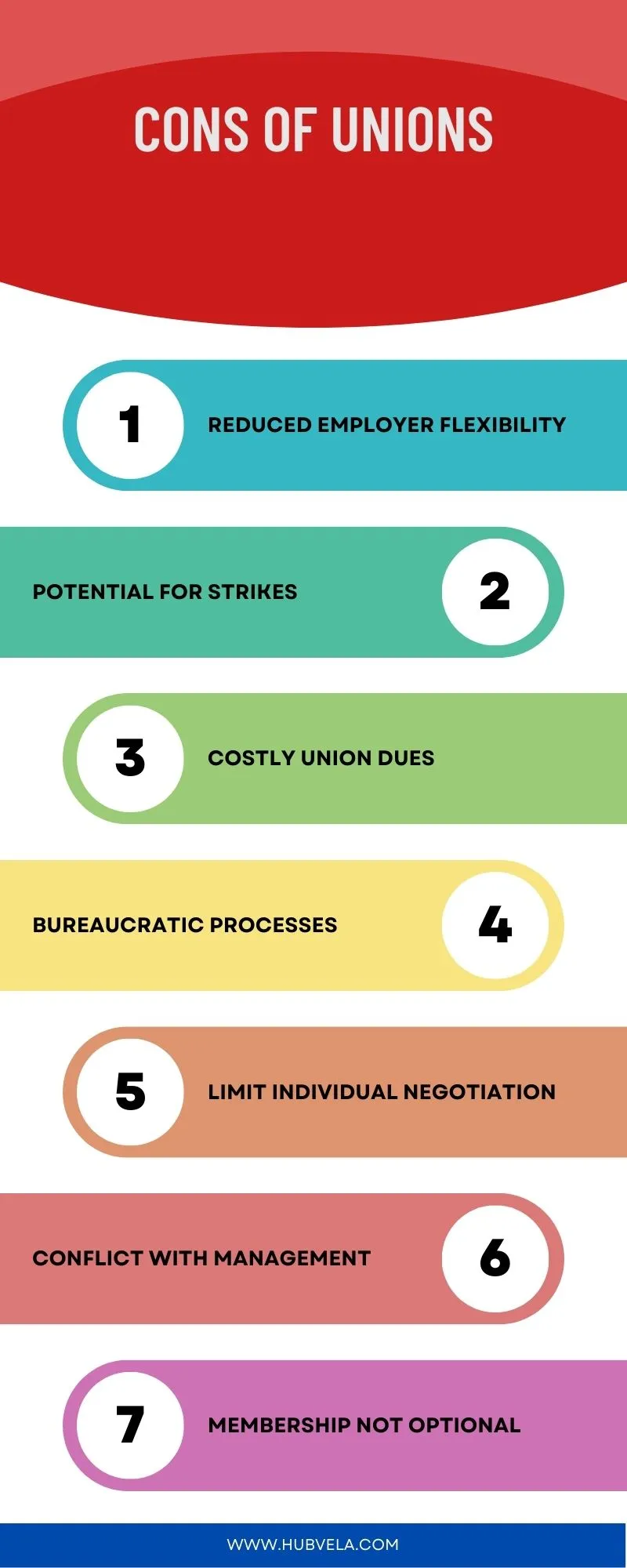Unions have been a topic of debate for many years, with both supporters and critics voicing their opinions on the benefits and drawbacks of unionization.
A union is an organization that represents workers in a particular industry or profession, negotiating with employers on behalf of its members to secure better wages, benefits, and working conditions.
While unions have played a significant role in improving the lives of workers, they also have their downsides. In this article, we will explore the pros and cons of unions, examining the advantages and disadvantages of unionization for both workers and employers.
By the end of this article, you will have a better understanding of the impact that unions can have on the workplace and the economy as a whole.

--Advertisement--
Pros of Unions
Unions have been a hotly debated topic for decades, with some arguing that they are a necessary tool for protecting workers’ rights and improving working conditions, while others believe that they are outdated and unnecessary in today’s modern workforce.
Despite the controversy surrounding them, there are many benefits to being part of a union. In this article, we will explore the pros of unions and why they continue to play an important role in the lives of workers around the world.

1. Job Security Benefits
To ensure job security benefits, unions negotiate with employers for specific clauses in the collective bargaining agreements. These clauses often include provisions for seniority-based promotions, layoff procedures, and protection from unjust dismissal. By establishing these safeguards, unions help protect workers from arbitrary firings and layoffs, providing a sense of stability and security in their jobs.
Unions can negotiate for recall rights, ensuring that laid-off employees have the opportunity to return to work when positions become available again. This assurance of job security benefits not only the individual workers but also contributes to a more stable and productive workforce overall.
Job security is a fundamental aspect of a healthy work environment, and unions play a crucial role in advocating for these protections.
2. Collective Bargaining Power
By securing job security benefits through collective bargaining, unions empower workers with the leverage to negotiate better working conditions and wages, showcasing their strength in advocating for employee rights.
Through collective bargaining, unions can represent the unified voice of employees, giving them a powerful platform to address concerns with employers. This collective strength enables workers to push for improved safety measures, fair work hours, and benefits that enhance their overall well-being.
Unions can help ensure that disciplinary actions are carried out fairly and that employees are treated equitably in the workplace. By coming together through collective bargaining, workers can level the playing field with employers, fostering a more balanced and respectful work environment.
3. Fair Wages Negotiation
Negotiating fair wages, unions provide workers with the opportunity to secure better compensation for their contributions and skills, ensuring they’re fairly rewarded for their hard work. By collective bargaining with employers, unions can advocate for higher wages, benefits, and improved working conditions. This unified approach empowers workers to have a stronger voice in determining their pay, leading to more equitable remuneration across the board.
Unions often establish standardized pay scales that prioritize experience and qualifications, further promoting fairness in compensation. Through fair wages negotiation, unions help bridge the gap between workers’ efforts and their earnings, fostering a sense of value and respect in the workplace. Ultimately, this process contributes to a more just and balanced economic environment for employees.
4. Workplace Safety Advocacy
When it comes to workplace safety advocacy, unions play a crucial role in ensuring the well-being of workers is prioritized.
Unions actively advocate for safe working conditions, pushing for proper training, equipment maintenance, and adherence to safety protocols. They provide a collective voice for employees to address safety concerns without fear of retaliation.
Through collective bargaining agreements, unions negotiate for stronger safety measures, inspections, and protocols, holding employers accountable for providing a safe environment.
Unions also offer support and resources for workers who face unsafe conditions or workplace accidents, advocating for compensation and assistance in navigating the aftermath.
5. Health Benefits Coverage
Unions actively advocate for comprehensive health benefits coverage to ensure the well-being of workers is protected. By negotiating with employers, unions secure robust health insurance plans that cover medical expenses, including doctor visits, prescriptions, and hospital stays. This coverage not only safeguards your physical health but also provides peace of mind knowing that you and your family are protected in case of illness or injury.
Union-negotiated health benefits often include dental and vision coverage, preventive care services, and mental health support. With access to these extensive healthcare benefits, you can focus on your work without worrying about accumulating medical bills or foregoing necessary treatments. Joining a union can significantly enhance your overall health and well-being.
6. Training and Education
To enhance your skills and knowledge, unions offer valuable training and education opportunities to their members. By joining a union, you gain access to specialized training programs that can help you advance in your career. These training sessions cover a wide range of topics, from technical skills to leadership development.
Unions often provide educational scholarships and grants to help members further their education or pursue certifications. This ongoing support ensures that you stay competitive in the job market and have the necessary skills to succeed in your industry.
Taking advantage of these training and education opportunities can open doors to new career paths and increase your earning potential.
7. Solidarity Among Workers
Fostering camaraderie and support among workers, unions promote a sense of unity and collective strength in the workplace. By encouraging solidarity, unions enable employees to stand together in negotiating better working conditions, wages, and benefits. This unity among workers can lead to improved morale, increased job satisfaction, and a shared sense of purpose.
When faced with challenges or disputes, having a union to back you can provide a feeling of security and empowerment. Solidarity among workers can create a more inclusive and equitable work environment where everyone’s voice is heard and respected.
Cons of Unions
Unions have long been a cornerstone of labor movements, advocating for workers’ rights and fair treatment in the workplace. However, it is important to consider the potential drawbacks associated with unions.
While they can provide significant benefits, such as collective bargaining power and improved working conditions, there are also several cons to consider.
We will explore the various cons of unions and their potential impact on both workers and employers.

1. Reduced Employer Flexibility
In reducing employer flexibility, unions often establish strict guidelines that can limit management’s decision-making autonomy. These guidelines can hinder the ability of employers to quickly adapt to changing market conditions or implement new strategies.
For instance, unions may dictate specific procedures for hiring, firing, or promoting employees, making it challenging for employers to make swift personnel decisions. Collective bargaining agreements negotiated by unions may restrict management’s ability to adjust work hours, job responsibilities, or workflow processes.
This reduced flexibility can result in slower responses to market demands, decreased efficiency, and potential conflicts between management and union representatives. Overall, while unions aim to protect workers’ rights, they can inadvertently constrain employer flexibility and hinder operational agility.
2. Potential for Strikes
Unions pose a significant risk of disrupting operations due to the potential for strikes. While strikes can be a powerful tool for workers to negotiate better conditions, they can also harm businesses by halting production, causing delays, and leading to financial losses.
The uncertainty surrounding strikes can create tension in the workplace, affecting employee morale and productivity. Strikes can damage relationships between employers and employees, leading to long-term negative consequences. The threat of strikes can also deter potential investors or clients, impacting the overall success of the business.
Therefore, the potential for strikes must be carefully considered when weighing the benefits and drawbacks of unionization in the workplace.
3. Costly Union Dues
Paying costly union dues can significantly impact your financial bottom line as a worker. While unions provide various benefits, including collective bargaining power and improved working conditions, the dues you pay can eat into your take-home pay.
These dues are often calculated as a percentage of your earnings, meaning the more you make, the more you pay. For some workers, especially those on lower incomes, these dues can be a substantial burden. If you don’t agree with how the union is spending your dues or the benefits you’re receiving in return, you may feel frustrated by the lack of control over this financial obligation.
It’s essential to weigh these costs against the benefits before deciding to join a union.
4. Bureaucratic Processes
Considering the bureaucratic processes within unions can be a significant drawback for many workers seeking efficient representation and decision-making. These processes often involve multiple layers of approval for decisions, leading to delays in addressing member concerns.
The need for extensive paperwork and formal procedures can slow down the resolution of issues and make it challenging for individual voices to be heard promptly. Moreover, navigating through complex bureaucratic structures within unions can be frustrating for workers who prefer a more straightforward approach to problem-solving.
This can result in a disconnect between union leadership and the members they represent, hindering the organization’s ability to respond swiftly to changing needs and concerns on the ground.
5. Limit Individual Negotiation
With unions in place, individual negotiation is often limited, which can impact the autonomy of workers in advocating for their specific needs and preferences. While unions can provide collective bargaining power, they may restrict individual employees from negotiating directly with their employers.
This limitation can be challenging for workers who’ve unique circumstances or preferences that aren’t addressed in the collective agreement. Without the ability to negotiate individually, employees may feel constrained in discussing flexible working hours, personalized benefits, or other specific arrangements that could benefit them.
Consequently, the lack of individual negotiation can lead to a one-size-fits-all approach that may not fully meet the diverse needs and aspirations of all workers within the union.
6. Conflict With Management
When conflicts arise between unions and management, it can create tension and hinder productive collaboration in the workplace. Disagreements over wages, benefits, working conditions, or disciplinary actions can lead to strained relationships and impede progress.
These conflicts often result in negotiations, grievances, or even strikes, causing disruptions and affecting overall efficiency. The adversarial nature of these disputes can breed animosity between employees and management, making it challenging to foster a positive work environment.
The constant back-and-forth between union representatives and management can also consume valuable time and resources that could otherwise be allocated to more constructive endeavors. Ultimately, these conflicts can generate a divisive atmosphere that may hinder the organization’s ability to achieve its goals.
7. Membership Not Optional
Membership in unions is mandatory, which can limit individual autonomy and flexibility in employment decisions. While unions provide collective bargaining power, the requirement for membership means that you must abide by union rules and decisions, even if they don’t align with your personal beliefs. This lack of choice can be frustrating, especially if you disagree with the union’s tactics or priorities.
Mandatory membership means that you have to pay union dues, whether you agree with the union’s actions or not. This financial obligation can be burdensome, particularly if you feel that the union isn’t effectively representing your interests. Ultimately, the lack of optional membership in unions can restrict your freedom to make independent choices in the workplace.
Conclusion on Pros and Cons of Unions
Overall, unions have both pros and cons that should be carefully considered. While they can provide workers with better wages, benefits, and job security, they can also lead to increased costs for employers and potential conflicts within the workplace.
It’s important to weigh these factors and assess the specific needs of your industry and workforce before deciding whether or not to unionize.
Ultimately, unions can be a powerful tool for advocating for workers’ rights, but they may not be the right choice for every situation.


